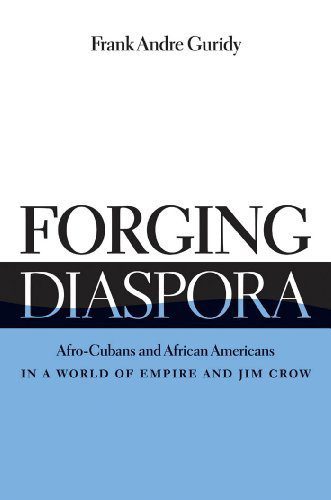Each January, hordes of historians descend on a big conference hotel somewhere in the US to present their research, hunt for very scarce new jobs, and to hang out with each other. UT was well represented this year.
Prof Frank Guridy won the Wesley-Logan Prize for his book, Forging Diaspora: Afro-Cubans and African Americans in a World of Empire and Jim Crow.

And one of our second-year graduate students, Yana Skorobogatov, who also happens to be our Assistant Editor here at Not Even Past, had her paper featured on another history department blog, Tropics of Meta, at Georgia State University. Here’s what they said about Yana’s paper (scroll down for a list of other UT presenters and topics):
Yana Skorobogatov, “‘The Higher Circles”: The Western Intellectual Community and the Campaign for Human Rights in the USSR, 1968–84″
Skorobogatov, a PhD student at the University of Texas, revealed an untold chapter in the history of both Western relations with the Soviet Union and the human rights movement. Focusing on “intellectuals as nonstate actors,” Skorobogatov looks at how members of the intelligentsia in the US and Europe tried to develop a coalition with Soviet dissidents to defend the rights of persecuted intellectuals in the détente era. In the process, NGOs (non-governmental organizations) and professional organizations in the sciences and academia set transnational values above national identity. Their efforts ran up against predictable resistance from Soviet authorities, who cited a 1932 act banning voluntary organizations as a pretext for suppressing human rights activism among scientists and other scholars. In response, dissidents argued that they were more like a group of co-authors than a formal organization.
Skorobogatov explained how Western scientists were haunted by the memory of corrupt and abusive science under the Nazis and sought to prevent the same abuses from occurring in the Soviet Union. They also identified with their counterparts in the USSR, who were increasingly accused of mental illnesses such as schizophrenia in order to incarcerate them under gruesome conditions and silence their dissent. (Such a maneuver avoided the need for a show trial and successfully impugned the integrity of the deviant scholar by discrediting their most valuable quality—intellect.) When one accused individual cited the Soviet Constitution to defend his right of free speech, one judge responded with incredulity. “Who takes Soviet laws seriously?” he said. “You are living in an unreal world.” (Enough said.) In response to such abuses, Western scholars decided to employ their “intellectual capital” as a weapon, Skorobogatov said, refusing to participate in or lend their own prestige to important scientific conferences in the Soviet Union. The efficacy of this tactic is hard to determine on the basis of the talk alone, and at least one audience member raised the question of whether Western scientists worked hard only to defend their “own kind,” as opposed to the many ordinary Soviet citizens who suffered oppression. In any case, though, this talk offered an intriguing window into the politics of science, international organizations, and human rights, as well as the internal tensions of détente itself
UT History AHA participants
Graduate Students
Stephen Dove: Redefining Primitive: Mayan Interpretations of Early Christianity, 1900-44
Renata Keller: Building a Revolutionary Community: The 1961 Latin American Peace Conference and the 1966 Tricontinental Conference in Comparative Perspective
Franz Hensel Riveros: Moral Therapeutics: Thrift and Temperance in Colombia’s Fin-de-Siècle
Bryan S. Glass: Education and Empire: Representations of the British Empire to Scottish Schoolchildren, 1945–65
Yana Skorobogatov: “The Higher Circles”: The Western Intellectual Community and the Campaign for Human Rights in the USSR, 1968–84
Karin Sanchez-Manriquez, University of Texas at Austin: The Chilean Catholic Church and the Social Question: Changes and Continuities in Catholic Thought in Chile, 1891–1935
Faculty:
Jeremi Suri: International Perspectives on American Democracy, Growth, and Expansion
Jeremi Suri: The Past and Future of American Nation-Building
Jorge Cañizares-Esguerra: The Typological Universe of the Spanish Hapsburgs
John McKiernan-Gonzalez: Puro Cuento: Everyday People and Transnational Public Health Formations at the Texas-Mexico Border, 1848-1942
Wm. Roger Louis (Chair): Historians, Journalists, and the Challenges of Getting it Right, Part 3: Interpreting the Arab Spring
Jeremi Suri (Chair): Historians, Journalists, and the Challenges of Getting it Right, Part 4: American Intervention
Jorge Cañizares-Esguerra (Chair): The Social Worlds of Devotional and Moral Discourses in Colonial Mexico and Guatemala
Jorge Cañizares-Esguerra (commentator): The Promise of De-centering National Histories: America, Germany, and Spain
Jacqueline Jones: Interviewing in the Job Market in the Twenty-First Century
Allan Tully: The Department Chair as Negotiator: Challenges Faced by History Department Chairs in These Perilous, Budget-Cutting Times
More on the AHA Annual Meeting can be found here



